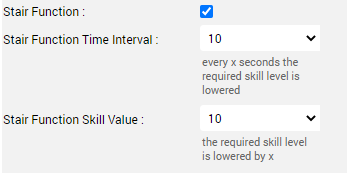...
We can decide how long the caller should wait before being connected to John Doe, by using the stair function.
...
Switch this on in the Distribution tab in the ACD group configuration:
How does it work?
- The stair function starts looking for available agents with skill 100.
...
- Every Stair Function Time Interval seconds, the required skill level is lowered by Stair Function Skill Value.
- So after 10 seconds, the system also considers agents with skill 90, after 20 seconds 80 ... and so on.
- This means that Agent Bob will be presented with the call after 50 seconds, given the example configuration here.
...
- And John Doe will be presented with the call after 80 seconds.
What have we achieved?
| Agent | What happens |
|---|---|
| Agent Ace | Agent Ace, because he has a skill level of 100 in the ACD group, will always be considered for calls immediately, assuming he is free and logged in for telephony events. |
| Agent Bob | Agent Bob will receive calls for this group, but only after 50 seconds have passed (5 time intervals, each 10 seconds long, and each time the system looks for agents with 10 skill less). |
| John Doe | Like Agent Bob, he will receive calls laster. However due to his skill level, the minimum queueing time will be 80 seconds. This means, that if during these 80 seconds a call is received by the system for John Doe's primary activity, he will get this first. |
...
- His new Skill in the ACD group will be 100 * 0.1 = 10
- Only while he is in the status Backoffice. Otherwise it will revert to 100.
| Info |
|---|
In combination with the stair function, this means that Agent Ace will only receive calls from the ACD group after 90 seconds waiting time. , when he is in the status Backoffice. |
Conclusions
- You can use the stair algorithm in addition to the skill based algorithm to influence how, and when your agents receive calls from an ACD group.
- The delay introduced by the stair function means that agents who have other primary tasks will get one of those tasks, as long as the task (call or event) arrives within the time interval required for that agent to be considered by the stair function.
- The time interval is variable - you choose how long callers should wait and how soon agents should help out with secondary tasks.
- If the agent still has no tasks, and the stair function has reached that agent's skill level, he will receive a call or event from a heavily loaded ACD group.
- Coupling this with the capability of changing agent skills depending on the status they are in, in is a very powerful mechanism for controlling who gets what tasks, and when.
...
